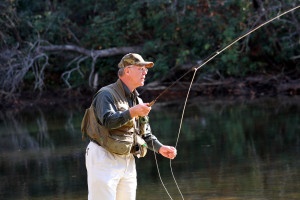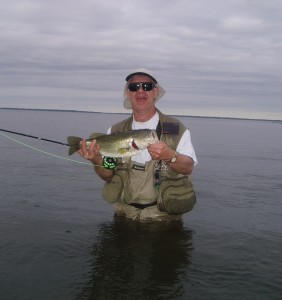We have much more to do and your continued support is needed now more than ever.
Hunters and Anglers Favor Restoring Clean Water Act Protections for Wetlands and Streams
This is a guest post by G. Richard Mode from the North Carolina Wildlife Federation.

I’m never happier than when my waders are wet. Short of the smiles on my grand children’s faces there is nothing in the world that lights me up like the iridescent color of a brook trout brought to hand in a North Carolina mountain stream, the shimmer of water that cascades from a largemouth bass blowing up on a popping bug or a group of pintails descending on a spread of decoys.
Good Fishing and Clean Water Go Hand in Hand
These are the moments in life I live for. Over a period of half a century I have spent more time and money than I care to admit trying to make the places these animals live better for them and for sportsmen and wildlife enthusiasts who care about them. Working on wildlife issues has been a terrific journey that taught me that what is good for wildlife habitats is good for people and the American economy. The last half century has been good for wildlife and water quality. With pictures of rivers burning on TV, Congress took action and in a show of bipartisan support passed The Clean Water Act of 1972. Since that time water quality has dramatically improved in America and fishery and wildlife habitat followed suit.
Unfortunately, after driving clean water initiatives for forty years the Clean Water Act is under attack by polluters, developers and decision makers who are in their pocket. Over the last few years there has been an organized effort in Washington D.C. and in the courts to roll back clean water protections. These efforts are aimed at headwater streams and wetlands.

Sportsmen and women of North Carolina and nationwide support the Administration’s initiative to restore Clean Water Act protections for these vulnerable waters, and we urge the President to follow through and finalize this initiative. In this terribly fractious election year, it is worth noting that poll after poll shows that a strong majority of Americans support strong federal Clean Water Act protections in order to ensure clean water for all. In the September national sportsmens’ poll, 79 percent of likely voters of all political affiliations said that they favor restoring Clean Water Act protections to wetlands and waterways, including smaller creeks and streams.
Celebrate Clean Water: Share Your Fish Tales
The Clean Water Act turns 40 this October. Let’s celebrate clean water and good fishing by reminding our elected leaders that anglers, boaters, hunters, and wildlife advocates support clean water and healthy habitat for wildlife, for people, and for the economy.
*For a bit of fishing fun, join me in celebrating clean water by sharing your fish tale with us on-line*
 G. Richard Mode serves as the North Carolina Wildlife Federation (NCWF) Affiliate Representative to the National Wildlife Federation (NWF) and NWF Outreach Coordinator in North Carolina. He was the founding President of the local Table Rock Chapter for Trout Unlimited (TU) and served as the President and Chairman of the Board of National TU. Among his achievements he was honored as the 2007 Budweiser/National Fish & Wildlife Foundation Conservationist of the Year. For years, Richard’s goal has been to bring American hunters, anglers, and wildlife enthusiasts to the public policy decision table to protect the special places and wildlife resources in America.
G. Richard Mode serves as the North Carolina Wildlife Federation (NCWF) Affiliate Representative to the National Wildlife Federation (NWF) and NWF Outreach Coordinator in North Carolina. He was the founding President of the local Table Rock Chapter for Trout Unlimited (TU) and served as the President and Chairman of the Board of National TU. Among his achievements he was honored as the 2007 Budweiser/National Fish & Wildlife Foundation Conservationist of the Year. For years, Richard’s goal has been to bring American hunters, anglers, and wildlife enthusiasts to the public policy decision table to protect the special places and wildlife resources in America.





















